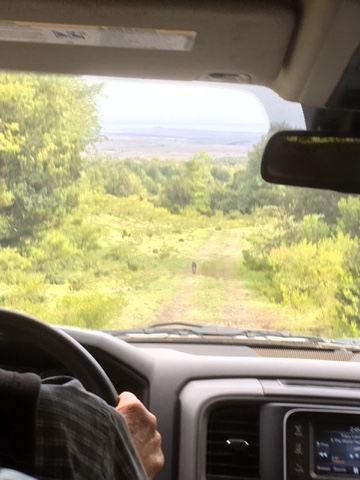"I want to farm", she said.
"I want to build my own house", she said.
"I want to create a homestead", she said.
"I want to be my own boss", she said.
"I want to be self reliant", she said.
Oh, sister! Be careful what you ask for!
I have little regrets. Yes, there's a few. But it has been worth it. Would I do it again, knowing what I've learned so far? Of course, yes. But let me tell ya, it's work! And time! Not for the lazy.
This past week has been fairly typical of life around here....
...A stretch of the fencing rotted through, so I had to immediately drop everything and make repairs. Ha, so much for adhering to a work schedule.
...Then the lawnmower started acting up....spend a morning getting parts and repairing the buggah. Around here that mower gets worked to death, so working on it is common place. But don't ask me how a spring for the speed governor disappeared in the grass somewhere.
...Opening my email, I find a notice that my onion seedlings have been mailed. Yikes. Rush to prepare the garden beds for them. Yup, another glitch in my work schedule.
...Sadly surveying the gardens, I rue to lack of sunshine. But the past 3 days there's been some sort of blinding, surely nuclear process going on in the sky. Geez, is that really the sun? I rejoice and have this crazy urge to dance in the garden with joy......perhaps sans clothes to appease and thank the garden gods.
...Recovered one greenhouse with the proper plastic, so I give in to my urge to seed it immediately. Yup, it wasn't on the work schedule. But it's now seeded with cucumbers, squash, and tomatoes.
...Last Friday night the generator for topping up the solar batteries crapped out. I have no nice words to say about that aging generator, nor the lack of sunshine lately. It was a good generator, and I said nice things about it up until 5 minutes after it died. Because of zero sun, we've been relying on that generator. What to do? Drop everything, of course, and run up to Kona and purchase a replacement. Oh my, the gods are now laughing, because we've just had several days of strong sun. I could have had that old generator repaired. But such is life. Looks like we will now have a back up spare. Perhaps someone else is in more need of it than ourselves? I'll ask around.
...It's been cold at night, down in the low 50s. With the house not insulated and windows that don't really shut all the way, that means we wake up to a chill. Thankfully I'm prepared with lots of stockpiled firewood.....past effort well spent. I'll just need to gather more wood to replace what we're burning now. Add it to the job list.
...Trying to keep to the planting schedule, we successfully sowed peas, beans, kale, radishes, lettuce, bok choy, leeks, broccoli, beets, chard, cabbage, and various herbs. Plus marigolds -- gotta have color in the garden!
...With a couple days of sun, I got the chance to get in some painting jobs done. They've been put off for weeks now. And don't forget the laundry. Sun = dry clothes.
...A plus..... for me that is. I actually got my Christmas packages packed and ready for mailing. I almost fainted with pride. This has got to be the first time in years and years that I got them ready to mail before the actual holiday! Of course this means that I didn't get the donkey's hooves trimmed today. Gotta get to that tomorrow first thing.


























































